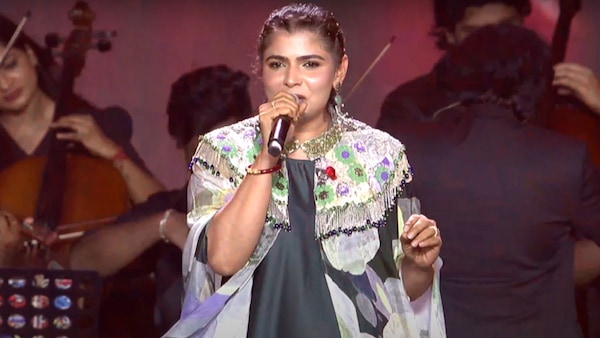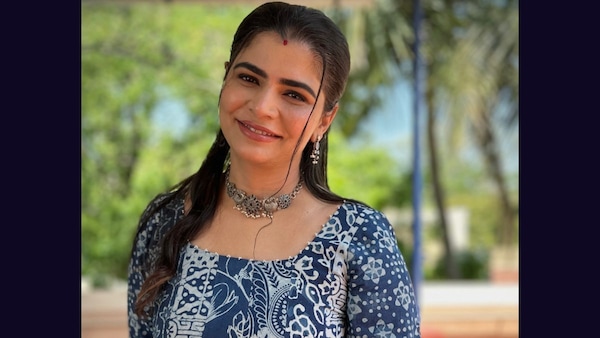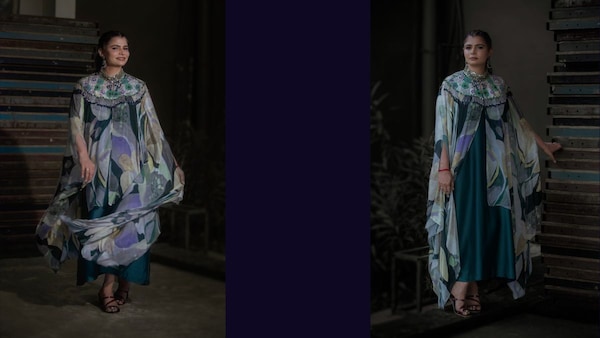Muted For Years, Chinmayi Finds Her Voice — & Her Audience — With 'Muththa Mazhai'
Trolled, banned, and made invisible, Chinmayi Sripaada found quiet vindication through 'Muththa Mazhai'. Her voice, long exiled from the mainstream, resurfaced to overwhelming warmth and support.

Chinmayi performing at the audio launch of Mani Ratnam's Thug Life.
Last Updated: 05.59 PM, Jun 20, 2025
ON JUNE 4, eight days after Saregama Tamil uploaded Chinmayi Sripaada’s version of ‘Muththa Mazhai’ sung at Mani Ratnam’s Thug Life’s audio launch, the comments were still pouring in. Words of affection, never used for Chinmayi since she spoke about poet Vairamuthu, were being openly put out. Music labels were sharing carousels of her songs, most of which predate 2018. Everyone felt like it was a personal win.
But, Chinmayi was deeply anxious over her court hearing the next day. Nothing really registered. From about 9.45 am to 10.45 am on June 5, she waited in court. For the intrusive questions, for queries that would make her wonder why she decided to fight back. But, there was a new judge, and a new date, later this month.
This routine is something the singer-voiceover artiste has been doing for six years now, since she decided to fight her ban from The South Indian Cine, Television Artistes and Dubbing Artistes Union, headed by Radha Ravi. Others before her, such as Dasharathi, have filed cases too, and are still fighting in court. In Chinmayi’s case, while there is an ‘unofficial’ ban on her giving voice-overs, there’s a shadow ban on her singing too.
In the nearly seven years since 96 (where she both sang and dubbed) released in October 2018 — till ‘Muththa Mazhai’, her most popular work with 36 million views on YouTube as of June 19 — she’s sung less than 15 songs in Tamil, and dubbed for three films — Hero and Leo have all been on the insistence of the directors, PS Mithran and Lokesh Kanagaraj, respectively.
The only people privy to her singing have been her family, including her twin children, and her circle of friends. Amid all this, the singer has not allowed her grief at being stopped from doing the one thing she loves and is trained in to step into her voice. She still cracks jokes, she still sings gibberish, she sang an entire night on Twitter Spaces during the COVID pandemic, finds time to record birthday songs for people who donate to an NGO she supports, and recreates the magic of the Ben 10 title song in Tamil and Telugu. All this has earned her love from a small and silent, but decidedly growing tribe of people who believe her. This is the tribe that came out as an unexpected support wave when 'Muththa Mazhai' was released, surprising many.
Despite this, the fact that she consistently questions gender stereotypes, outdated cultural practices and power imbalance in personal relationships, and raises awareness about child sexual abuse, has seen her being inordinately trolled by either side of the divide. Her caste location is often cited as the reason she chose to ‘tarnish’ the name of a much-revered poet.

What ‘Muththa Mazhai’ has done is eradicate all that negativity in one fell swoop, like the first summer downpour washes away all the accumulated dust of the previous months. Her cover performance of ‘Muththa Mazhai’ at the audio launch has been among the top 10, both in India and across the world, on YouTube.
Chinmayi still cannot believe that she’s getting to read positive comments and receive love other than from her safe space. “I’d simply lost touch with experiencing joy from my craft. This is a new feeling,” the normally expressive Chinmayi struggles to put her thoughts into words. And, the groundswell of support shook her in surprise. “I allowed myself to savour and enjoy that love. I knew that despite all this, I would have to sit alone in court, like I did the day my father-in-law had to be cremated, I would face trolls, bans, and my life would not change as such, but for once, I allowed that love to heal me.”
But she still was not able to handle the rush of compliments that came her way. She was unable to respond the way the world would have expected her to. “Someone I know sent me a note that when someone is very traumatised, they feel this joy is temporary and is not real or will not last, and they decide not to feel it, to protect themselves from possible future pain. That helped me understand why I’ve been the way I have been the past few years,” says Chinmayi. “It helped me process the rage I felt, the unfairness of it all,” says Chinmayi, sitting at the Chennai airport with her children, back home to Hyderabad after the court hearing that never was. She spoke of how she stopped expecting fairness, how she found herself weeping in a corner in temples, because nothing would reduce the pain she felt. “But, you know what has been most liberating?” she asks, her dulcet voice breaking. “Finally, no one was telling me I was a liar, no one told me to my face that I was sleeping with someone, adjusting with someone… That was very new to the ears, only used to abuse.”
The breaking point was a young boy’s reel where he spoke about how her rendition of 'Muththa Mazhai' moved him and how he was sorry his generation did not support her when the issue began, because they were kids in school and did not know better. He ended by saying that if those on his timeline wanted to say something nice to her, they could. “I felt safe, yes, safe. And, I realised I had to wait for children to grow up and become adults to help me, because the adults of 2018 just would not listen. Now, I hear some voices of support from the industry. This is all very new, and I don’t know how long this will last, and there is a fear of impending doom.”
The kind words that have come her way have also done their bit to wash away a bit of the exhaustion she has felt over the years. “I am tired. For someone who loves her music, what they did was make me doubt my capability and that I could offer anything of value. I really believed the days when I was told I was doing a good job singing were behind me. This acknowledgement is priceless, that way.”

Everyone has been speaking of the playfulness that creeps into 'Muththa Mazhai' in unexpected places and that gentle laughter. “I really don’t know what got into me while singing that. I can’t remember the last time I sang for an audio launch. Probably, for Vinnaithaandi Varuvaayaa, when we were taken to London to perform.”
After two to three days of luxuriating in the love, Chinmayi was back with her advocacy, much to the angst of those who believe feminism is a bad word. “They made bad examples of us, but what about future survivors? Everyone needs a voice. And, with time, many have realised that this is a basic home truth. Even if just 10 people change their thought process, it’s a win. The world will be a kinder place.”
What gave Chinmayi faith to carry on was family support and the fact that she was not financially dependent on singing and voiceovers. “I ran my translation company and skin care company. I could sustain myself well and that rankled people, because that was one aspect that they could use to force me. Everyone cannot afford that. It is a deep privilege I acknowledge.”
But, now, after a forced exile, the songstress is back where she belongs — behind a mic. Her audience could not be happier. New songs are being announced, a tour has been planned, and Chinmayi is also in the news for her singing. And now, she’s getting ready to answer again the one question that has always been asked of her — “Oh, you sang this song! We never knew”.

